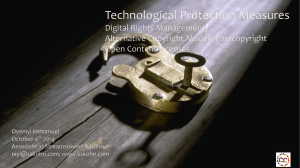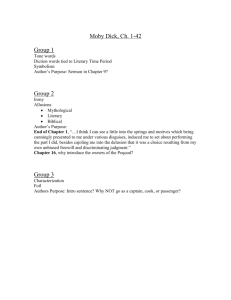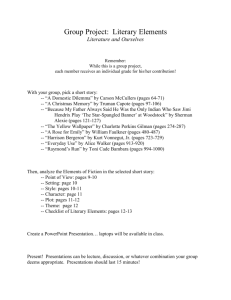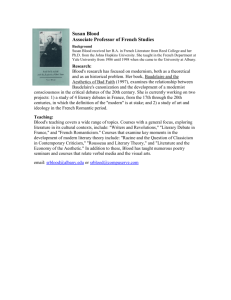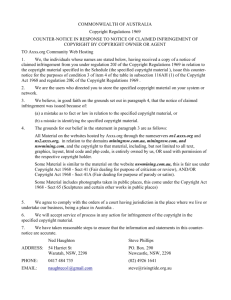Copyright Protection
advertisement
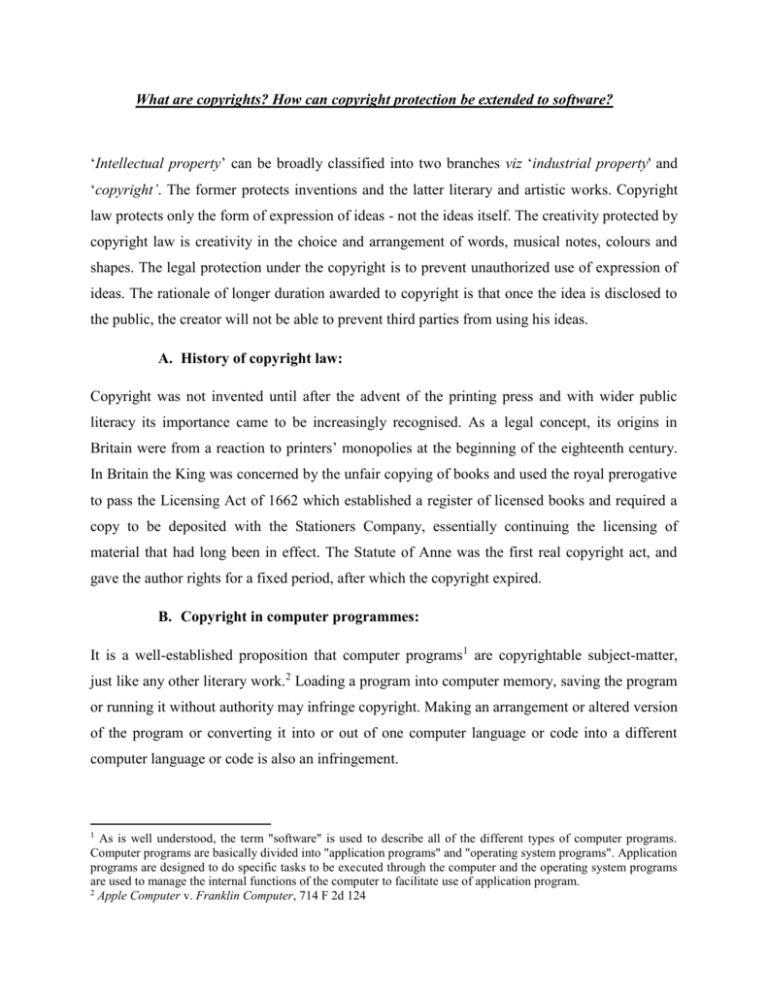
What are copyrights? How can copyright protection be extended to software? ‘Intellectual property’ can be broadly classified into two branches viz ‘industrial property' and ‘copyright’. The former protects inventions and the latter literary and artistic works. Copyright law protects only the form of expression of ideas - not the ideas itself. The creativity protected by copyright law is creativity in the choice and arrangement of words, musical notes, colours and shapes. The legal protection under the copyright is to prevent unauthorized use of expression of ideas. The rationale of longer duration awarded to copyright is that once the idea is disclosed to the public, the creator will not be able to prevent third parties from using his ideas. A. History of copyright law: Copyright was not invented until after the advent of the printing press and with wider public literacy its importance came to be increasingly recognised. As a legal concept, its origins in Britain were from a reaction to printers’ monopolies at the beginning of the eighteenth century. In Britain the King was concerned by the unfair copying of books and used the royal prerogative to pass the Licensing Act of 1662 which established a register of licensed books and required a copy to be deposited with the Stationers Company, essentially continuing the licensing of material that had long been in effect. The Statute of Anne was the first real copyright act, and gave the author rights for a fixed period, after which the copyright expired. B. Copyright in computer programmes: It is a well-established proposition that computer programs1 are copyrightable subject-matter, just like any other literary work.2 Loading a program into computer memory, saving the program or running it without authority may infringe copyright. Making an arrangement or altered version of the program or converting it into or out of one computer language or code into a different computer language or code is also an infringement. 1 As is well understood, the term "software" is used to describe all of the different types of computer programs. Computer programs are basically divided into "application programs" and "operating system programs". Application programs are designed to do specific tasks to be executed through the computer and the operating system programs are used to manage the internal functions of the computer to facilitate use of application program. 2 Apple Computer v. Franklin Computer, 714 F 2d 124 Article 10 of the Trade Related Intellectual Property Rights Agreement (TRIPs) expressly provides that computer programs, whether in source code or object code shall be protected as literary works under the Berne Convention, 1971. The relevant provisions of the Copyright Act, 1957 which are pertinent in this context are set out hereunder: ‘computer’ includes any electronic or similar device having information processing capabilities3; ‘computer programme’ means a set of instructions expressed in words, codes, schemes or in any other form, including a machine readable medium, capable of causing a computer to perform a particular task or achieve a particular result4; ‘literary work’ includes computer programmes, tables and compilations including computer databases5; Thus, under Indian copyright law, computer programs are considered to be literary works and accordingly entitled to copyright protection. Hence, the software on the basis of which the computer program operates may be the subject matter of a copyright under the Act. C. Rights conferred: Section 14 of the Act explains the meaning of copyright and elaborates the rights of a copyright holder: ‘14. Meaning of copyright.-For the purposes of this Act, 'copyright' means the exclusive right subject to the provisions of this Act, to do or authorise the doing of any of the following acts in respect of a work or any substantial part thereof, namely(a) …; (b) in the case of a computer programme,(i) to do any of the acts specified in clause (a); 3 Section 2 (ffb) of the Act Section 2(ffc) of the Act 5 Section 2(o) of the Act 4 (ii) to sell or give on hire, or offer for sale or hire, any copy of the computer programme, regardless of whether such copy has been sold or given on hire on earlier occasions;’ D. Infringement of copyright: Section 55 of the Act provides the remedies which are available to the copyright owner in cases of infringement of copyright: (1) Where copyright in any work has been infringed, the owner of the copyright shall, except as otherwise provided by this Act, be entitled to all such remedies by way of injunction, damages, accounts and otherwise as are or may be conferred by law for the infringement of a right: In addition to the above, certain additional rights are conferred upon the author of the copyright. 6 In most cases of serious copyright infringement, the courts have granted punitive damages. From the above it is clear that the software tools developed by a company may be the subject mater of a copyright. This however, should not be confused with those software tools which are used in conjunction with hardware tools to provide other services, which would form the subject matter of patents. In other words, copyright protection would lie over the software tools alone, while the combination of software and hardware would form the subject matter of patents under the Patent Act, 1970. RAHUL DONDE 6 S. 57 of the Act



